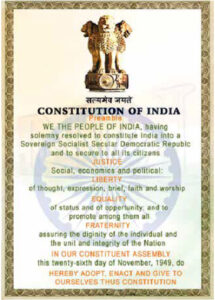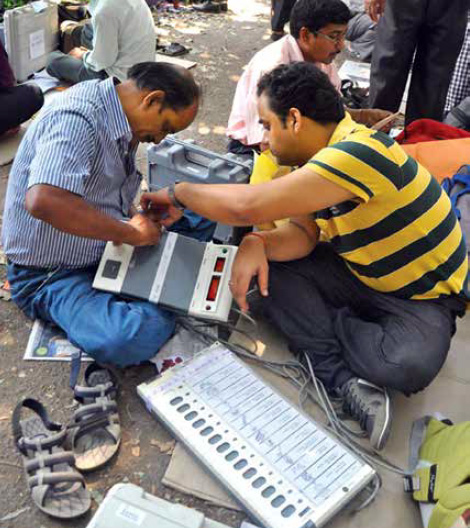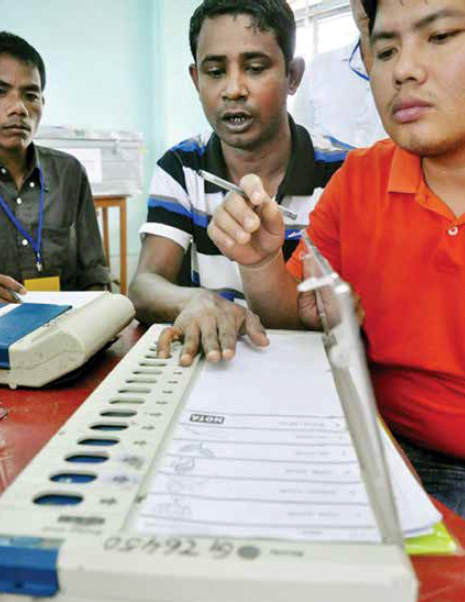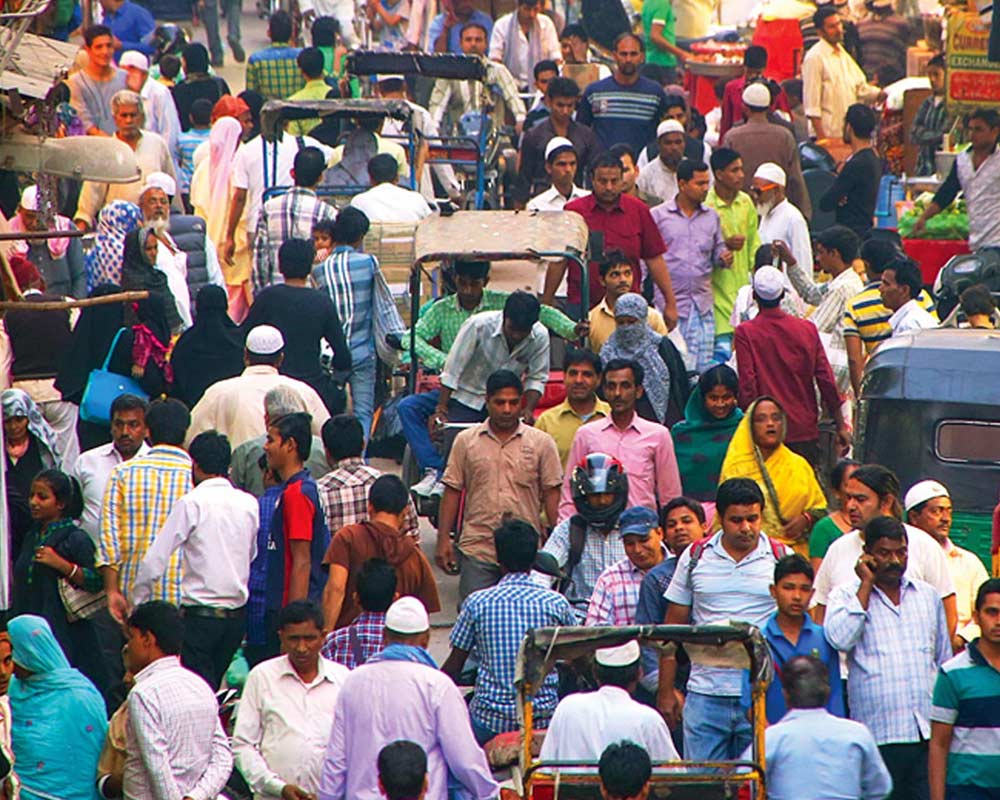INDIAN Republic has turned 70. In the run up to India’s independence, the Constituent Assembly was entrusted with the task of drafting a ‘Charter of Governance’ for the nation’s teeming and parched millions emerging out of the shadow of slavery into the glow of freedom. The Assembly began its deliberations on December 9, 1946. On that day, envisioning the governing structure of the world’s newest and largest democracy, Sachidanand Sinha, Provisional Chairman of the Assembly, approvingly quoted the resounding words of Joseph Story describing the Constitution of the United States of America: “The structure has been erected by architects of consummate skill and fidelity; its foundations are solid; its compartments are beautiful as well as useful; its arrangements are full of wisdom and order; and its defences are impregnable from without; It has been reared for immortality, if the work of man may justly aspire for such title…..Republics are created-these are the words, which I commend to you for your consideration—by the virtue, public spirit and intelligence of the citizens. They fall when the wise are banished from the public councils because they dare to be honest, and the profligate are rewarded because they flatter the people in order to betray them.”
Republic of India was structured on similar lines. But seven decades in to its working, it is tottering and sinking because the virtue, public spirit and intelligence of India’s citizens are under assault and the “wise among her sons and daughters have been banished from the public councils for their honesty and integrity, and the profligates rewarded because they are venal, communal and servile”. Democracy has shrunk and has been replaced by a creeping ‘plutocracy cum kleptocracy’ marked by slavish flattery, autocratic arrogance, unbridled greed and criminalized corruption. In the event, Indian Republic, so painstakingly constructed by our Founding Fathers, is falling apart and is on the precipice of collapse.

Institutions of democratic governance built into the Constitution and other laws and legislations are being ravaged in order to destroy the democratic edifice and build an autocratic state. Instances are the sharp decline of the office of President of India, the Council of Ministers, Parliament, and Constitutional bodies like CAG and the Election Commission. In order to concentrate political and administrative power in few hands, instruments of public service are either demolished or made to self-destruct in order snatch them away from the people and hand them over to a small coterie of Oligarchs who own over 75 per cent of India’s wealth today. In recent years well-orchestrated communal hatred and polarisation agenda has been unleashed to strengthen the hold of these Oligarchs on India’s economy and polity.
The higher judiciary, the last bastion of freedom and democracy is itself in deep distress. Four senior judges of the Supreme Court ‘paying their debt to the nation’ were forced to place their case before ‘We, the People’ with this poignant statement by the senior most among them: “We are all…four of us are convinced that unless this institution is preserved and it maintains its equanimity, democracy will not survive in this country.” Since then things have gone from bad to worse affecting the very credibility of this highest court of the land!

All-India Services, public sector banks, public sector undertakings, public broadcaster (Prasar Bharati), defence installations, telecommunication industry, port trusts, statistical commission are all being deliberately enfeebled and sabotaged from within. ‘Development’ has become a farce to hand over massive amount of public money to private individuals through predatory ‘infrastructure’ projects while starving the critical agriculture and social sectors. This has made India the most non-inclusive and inequitable country in the world only next to Russia! Most of the mainstream media owned or controlled by the Oligarchs have turned mercenary and are singing the paeans of those who are systematically devastating the Republic and the institutions of people’s power.
These are the words contained in the Preamble to the Constitution of India: “We, the People of India having solemnly resolved to constitute India into a Sovereign, Socialist, Secular, Democratic Republic and to secure to all its citizens Justice, social, economic and political; Liberty of thought, expression, belief, faith and worship; Equity of status and of opportunity and to promote among them all fraternity assuring the dignity of the individual and the unity and integrity of the Nation….do hereby adopt, enact and give to ourselves this constitution.”
SADLY, over the years, these core objectives have been mingled in dust. Justice has become inaccessible, distant, costly and purchasable; Liberty is ravaged by a spate of freedom-killing preventive detention laws and gross abuse of the IPC provisions of sedition and ‘waging war against the state’ as well as Sections of the IT Act; Equity is evaporating with governments selling/mortgaging country’s assets to MNCs and big businesses in the garb of ‘Reforms’. And with hate-mongering on the rise, Fraternity is faltering with dignity of the individual and integrity of the Nation being severely compromised.
Though the Commission has emphatically ruled out the return to paper-ballot as demanded by many political parties, it has done precious little to make the EVMs credible by auditing and cross verifying the electronic count with the manual counting of substantial percentage of Voter Verified Paper Audit Trail (VVPAT) slips. Instead it has restricted this to an abysmally low of one booth per assembly constituency which works out to 0.4 to 0.9 per cent depending on the size of the constituency
As for institutions and instruments of democratic governance less said the better: Political parties, sans any semblance of rules and regulations, have become personal fiefdoms; ‘Council of Ministers’ function as surrogates of the rich and the powerful; Parliament has virtually turned into a trading house; Superior courts are choked; CAG and Election Commission have become power-wielder’s tools; bureaucracy has turned into subservient adhocracy; CBI has become a ‘caged dog’; Human Rights and Information Commissions are dump-yards for sinecure-seekers; National Green Tribunals have been made non-functional; Lokpal Act and Judicial Accountability Bill scuttled; and, RTI Act sabotaged from within by draining out the Information Commissions.

With corruption, fraud and scams erupting like volcano India is fast becoming a ‘failed state’ with all the characteristics described by Robert Rotberg in his seminal Book, ‘When States Fail: Causes and Consequences’: “Failed states offer unparalleled economic opportunity only for a privileged few. Those around the ruling oligarchy grow richer while their less fortunate brethren starve…. The privilege of making immense profits and fortune when everything else is deteriorating is confined to clients of the ruling elite…. The nation-state’s responsibility to maximize the well-being and prosperity of all its citizens is conspicuously absent….and escalating levels of venal corruption mark failed states.”
Founding Fathers had called for a Constitution “wherein all power and authority of the Sovereign Independent India, its constituent parts and organs of government, are derived from the people”. Their vision of ‘Swaraj’ envisaged people-based governance with a bottom-up decision-making process that would give everyone ‘a place in the sun’.
In Gandhian thoughts, India’s democratic governance structure would rise storey by storey from the foundation comprising of self-governing, self-sufficient, agro-industrial, urbo-rural local communities. These self-governing entities will control and regulate the use of natural resources for the good of the community and the nation. This was the trust reposed by the Founding Fathers on the Parliament.
BUT the governance structure we have today is all-powerful Central and State governments controlling and mismanaging all financial and natural resources. What is worse, decision-making is being further centralised. There is no trace of grassroots democracy or Swaraj.
‘Fear’ seems to be the overarching tool of governance. For this purpose, most draconian and anti-people provisions of the Indian Penal Code-Section 121: “Waging, or attempting to wage war, or abetting waging of war, against the Government of India and Section 124A: Sedition, both prescribing life imprisonment-are being liberally misused by the state against intellectuals and dissenters including brilliant and patriotic students.
Development’ has become a farce to hand over massive amount of public money to private individuals through predatory ‘infrastructure’ projects while starving the critical agriculture and social sectors. This has made India the most non-inclusive and inequitable country in the world only next to Russia!
In the last few years, ‘demonetisation’, Aadhaar and, to some extent, GST have been used to ‘terrorise’ the common man and make him run around like headless chicken by destabilising his life and livelihood. ‘Liberalisation and privatisation’ have turned educational institutions into windowless fortress preventing young minds from blossoming in to fruitful citizens and future leaders. Under the watch of successive Parliaments, while democracy and development have diminished for the common man India has acquired the characteristics of a ‘failed state.’
What is the way out? Put in simple terms, the need of the hour is to re-democratise India’s polity, governance and management of its natural resources as well as restoring ‘people’s power’ to where it really belongs—at the epicentre of democracy. This is not merely a question of constitutional forms or political systems. It is a creative question in the widest sense of the term. It is a question of an ancient country finding its lost soul again.

The task also is one of social engineering, needing the help of politicians, scientists, experts, administrators, educationists, businessmen, experimenters; of men and women; of young and old. It is a task of dedication; of creation; of self-discovery. It is a task that defines India’s destiny. It spells a challenge to India’s sons and daughters!
This is the task cut out for the forthcoming election to Parliament. This task is primarily meant for ‘We, The People’. But as the primary institution and principal ‘watchdog’ of democracy it is the responsibility of Election Commission of India (ECI) to make this happen. This is the letter and spirit of Article 324 (1) of the Constitution of India that vests the power of superintendence, direction, control and the conduct of all elections to Parliament and to the Legislature of every State with the ECI. This constitutional mandate that gives plenipotentiary powers to the ECI is further fortified by several judgments delivered by Supreme Court holding conduct of ‘free and fair’ election as basic structure of the Constitution.
It is an acknowledged fact that ECI is world’s most massive election machinery. There is also no doubt that country’s track record of timely and efficient elections has given considerable prestige to ECI and legitimacy to India’s democratic polity and its politicians who are the beneficiaries. But the moot question is what kind of people get elected? Nearly a third of elected representatives face serious criminal charges such as murder, rape, abduction and offences relating to moral turpitude. Almost all of them have amassed unaccounted wealth in black assets! To them are now added hate-mongers and myth-peddlers! In the event, our democracy stands considerably diminished. Let alone reclaiming the Republic, more of these worthies will further draw it down the drain.
In order to enable people to elect honest and democratic leadership ECI should conduct the general elections in compliance with democracy principles. These are:
- Voting public should see and be satisfied that their vote is correctly recorded and counted;
- The electoral process is subject to public scrutiny/examinability;
- Ordinary citizens should be able to understand and follow the election process without special expert knowledge and
- There should be verifiability in the counting of votes and ascertainment of the results in a transparent manner.
While paper-ballot, despite its flaws, comply with all these principles, EVMs do not despite claims of being devices of technology excellence. In the event, the very integrity of India’s
electoral process, nay democracy, itself is at stake.
DESPITE this clear picture ECI has been insisting on dealing with this as a technology issue and not one that concerns democracy. Whenever public suspicion is raised about EVMs, ECI has been responding in a mechanical manner. Though the Commission has emphatically ruled out the return to paper-ballot as demanded by many political parties, it has done precious little to make the EVMs credible by auditing and cross verifying the electronic count with the manual counting of substantial percentage of Voter Verified Paper Audit Trail (VVPAT) slips. Instead it has restricted this to an abysmally low of one booth per assembly constituency which works out to 0.4 to 0.9 per cent depending on the size of the constituency.
ECI is mandated to provide the people of India a polling process that would ensure democratic legitimacy. This calls for substantial scrutiny and verification of VVPAT slips not only to detect but also to deter efforts towards stealing people’s mandate. For this to happen, ECI should stand for democracy and not technology. Only then India will have a true Republic.
Writer is a former Army and IAS Officer
IAS (retd) with a distinguished career of 40 years - worked in Army, Govt, Private, Politics & NGOs.


























































